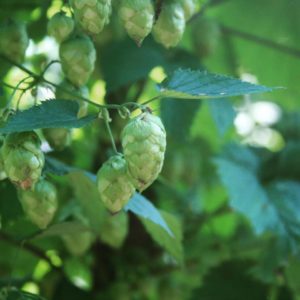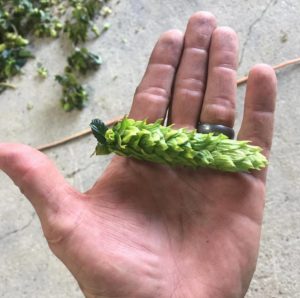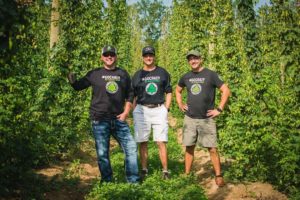Vines spiraling upwards around a rope. Conical buds that look like mini artichokes. It’s a newcomer to our local agriculture industry—hops.
Crazy Horse Hops is a 60-plus acre farm on the western edge of Henry County. They grow and process five different varieties of hops for sale to craft breweries in the midwest area.
The farm is owned and operated by Ryan Hammer (CEO), Dr. Todd Kaminski (CFO), and Josh Martin (COO). They consider this trio to be a great fit with their talents: Hammer holds the knowledge of the hop plant, Kaminski brings financial experience, and Martin is a large-scale farmer.
Hammer started in 2012 with 20 hop plants of 4 different varieties—“all the wrong ones,” he joked. He says that hops are harder to grow here because the conditions are moist; mildew and diseases can plague a midwest hops farm. Most hops grown in this country are on farms in the west, as drier conditions are more conducive to hops growth.
Additionally, the hops farms out west are much larger and the equipment isn’t suitable for an operation the size of Crazy Horse Hops. Hammer states that he often buys machinery from Germany, as their farms are similar in scale. But small scale can mean high tech; he has an app on his phone which allows him to monitor the irrigation system.
Hammer wanted to get in on the local foods movement, and the rise in the popularity of craft beers has made the farm possible. He states that artisan brews are around 8% of the market, but they use about 60% of the hops grown. In Indiana alone there are 130-140 breweries. Greenfield’s Wooden Bear is a big customer.
Martin got involved in 2014 when Hammer was looking for land to grow hops and chance brought the two of them together. He said that the actual work of the farm isn’t a problem but rather trying to pioneer an industry.
Martin states that at first banks didn’t know what they were and so didn’t want to loan them money. And breweries were concerned about quality and were reluctant to buy until Crazy Horse Hops established legitimacy. But after the first year the tide turned in their favor.
Hops are planted in spring and harvested in fall, but they are weeks ahead of corn and soybeans on both seasons. This is helpful to not interfere with Martin’s other farming, and also helps with the availability of labor. 100 acres of hops is more profitable than 3000 acres of corn, but hops are far more labor intensive.
Kaminski has farmed with Martin’s father, and joined the hops operation in 2015. He maintains his dental practice in Greenfield but is still at the farm several times a week. But he jokes, “They don’t tell me where they keep the keys to the tractor.”
He says there are maybe 20 hops growers in Indiana, but all of their acreage together doesn’t equal Crazy Horse Hops. Their goal is for 110 acres. They also want to be the largest distributor. They can process hops into pellets which aids in storage and shelf life. They plan to offer this service to other hops growers and even act as a hops broker.
There are also plans with Indianapolis’ Sun King Brewery for an all-local beer, with barley from a local grower and hops from Crazy Horse. They also plan to work with home brew equipment supplier Great Fermentations in Indianapolis. And the future might hold the possibility of U-pick hops for hobbyist brewers.
Potential additions include a tap room, where guests can taste beers from various breweries who use Crazy Horse Hops. Tours of the operation are in the works, since a hops farm is such a novelty in the area. They want to make the farm a destination and welcome the whole family, with picnic and play areas.
They can be found on the web at www.crazyhorsehops.com.


